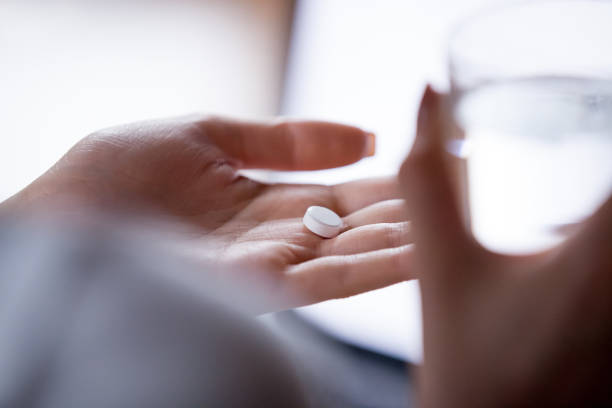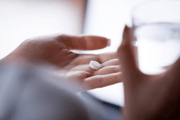
When most of us think about heart attacks, we picture dramatic Hollywood scenes—someone clutching their chest and collapsing in obvious distress. But for many Australians over 60, the reality is far more subtle and potentially dangerous.
What might feel like indigestion, fatigue, or even back pain could actually be your heart crying out for help.
Dr Katie, a Melbourne emergency physician who has gained attention for her practical medical advice, recently shared a simple tip that has sparked considerable discussion: chewing an aspirin at the first sign of a heart attack could mean the difference between life and death. But there's more to this story than meets the eye.
The numbers that matter to you
The statistics paint a sobering picture for Australian seniors. Each year in Australia, there are over 57,000 acute coronary events among people aged 25 and over. This is equivalent to nearly 160 people every day, or one person every nine minutes.
Even more telling, in 2023-24, over 199,000 Heart Health Checks were processed by Medicare, with checks most commonly conducted among people aged 55-64 (61,000) and 65-74 (53,200).
In 2022, CVD was the underlying cause of 45,000 deaths (24 per cent of all deaths), making it the second leading cause of death group, behind cancers. These aren't just numbers—they represent our mates, partners, and family members.
'This tiny pill, and calling an ambulance, could be the difference between life and death'
The aspirin controversy: what you need to know
Dr Katie's advice about chewing aspirin has solid backing from Australian medical authorities. According to Healthdirect Australia, if you are having symptoms of a heart attack, you should 'chew aspirin — take 300 milligrams of aspirin (unless you are allergic to it). Chewing aspirin during a heart attack can help reduce heart damage.'
The Australian and New Zealand Resuscitation Council suggests that first aiders give aspirin (300 mg orally) to adults with non-traumatic chest pain unless the person has known anaphylaxis to aspirin.
However, it's worth noting that some international medical bodies have become more cautious. Recent advice suggests people who think they are having a heart attack should not take aspirin on their own, as their symptoms might be caused by a different problem that might be made worse by taking aspirin.
The key difference? Australian guidelines emphasise calling emergency services first, then following their advice about aspirin, while some overseas recommendations now suggest waiting entirely for medical professionals to make that decision.
The subtle signs you shouldn't ignore
Here's where things get particularly important for older Australians. A heart attack can occur in a person without chest pain or discomfort, with the most common symptom of heart attack in a person without chest pain being shortness of breath.
Dr Katie emphasised that symptoms can be especially understated in women, often presenting as dizziness, fatigue, or even back pain rather than the classic chest-crushing sensation. For seniors, this subtlety can be particularly dangerous because these symptoms are often dismissed as normal ageing concerns.
Warning signs that could indicate a heart attack
Pressure or discomfort in the chest, neck, jaw, or arms
Shortness of breath without obvious cause
Unexplained nausea or sweating
Sudden fatigue or dizziness
Back pain (especially in women)
Symptoms lasting more than 10 minutes
A general feeling that 'something's not right'
The reality is that a person who experiences a heart attack may pass off their symptoms as 'just indigestion'. This tendency to minimise symptoms can be particularly dangerous for our generation, who were raised to 'soldier on' through discomfort.
Your emergency action plan
If the warning signs are severe, get worse quickly, or last longer than 10 minutes, act immediately. Here's exactly what Australian medical authorities recommend:
Step 1: Call 000 immediately - Call triple zero (000) and ask for an ambulance. This should always be your first action, not your last resort.
Step 2: Follow operator advice - When you call 911 (or 000 in Australia), the operator may recommend taking an aspirin. They will make sure you don't have an allergy to aspirin or a condition that makes using it too risky.
Step 3: Take aspirin if advised - Give 300 milligrams of aspirin (usually one tablet) unless the patient is allergic to aspirin or their doctor has warned them against taking aspirin. Chewing it works faster than swallowing it whole.
Step 4: Stay calm and rest - Sit down in a comfortable position and try to stay calm while waiting for help.
Your heart attack action plan
- Call 000 first—don't delay or 'wait and see'
- Follow the operator's advice about aspirin (300mg if recommended)
- Chew the aspirin rather than swallowing it whole
- Stay with someone if possible until help arrives
- Don't drive yourself to hospital
Why aspirin works (and when it doesn't)
Aspirin is an 'antiplatelet medicine' which means it acts on small blood cells called platelets. These play an important role in blood clotting and wound healing because they make the blood stickier.
During a heart attack, the blood supply to the heart is blocked, often caused when a blood clot breaks off from a fatty plaque in a coronary artery.
Aspirin helps by stopping these clots from getting bigger and making the blood thinner so more can get past the clot and deliver oxygen to the heart.
However, this is precisely why aspirin isn't suitable for everyone. If your chest pain is caused by something other than a blocked artery—such as a tear in the aorta—aspirin could make bleeding worse.
Looking after your heart beyond the emergency
While emergency response is crucial, prevention remains your best defence. Medicare-subsidised Heart Health Checks are available and particularly popular among those aged 55-74. These checks can identify risk factors before they become emergencies.
The encouraging news is that the CVD death rate has declined by more than three-quarters for both males (79 per cent) and females (77 per cent) between 1980 and 2022, driven by major public health improvements with advancements in both prevention and treatment.
The conversation starter you need
Many of Dr Katie's followers admitted they'd never considered keeping aspirin handy for emergencies. One viewer shared: 'My friend probably saved her husband's life recently by giving him an aspirin. He had one heart attack at home and another an hour later in hospital. He's doing OK.'
But here's what's equally important: having that conversation with your GP about whether aspirin is right for you, both in emergencies and potentially as ongoing prevention. You should not take a daily low-dose aspirin without talking to your primary health care provider.
The risks and benefits vary for each person. If you have had a heart attack or stroke, your health care professional might prescribe a daily low-dose aspirin to help prevent another.
Your next steps
Dr Katie's viral video has done something valuable—it's got people talking about heart health and emergency preparedness. But the conversation shouldn't stop with social media.
Consider this your prompt to:
- Book that Heart Health Check if you haven't had one recently
- Discuss aspirin therapy with your GP, both for emergencies and prevention
- Make sure your family knows the real signs of a heart attack
- Check that you have current emergency contacts readily available
The tiny aspirin tablet sitting in your medicine cabinet might indeed be a lifesaver, but only as part of a broader approach to heart health that includes professional medical guidance, awareness of symptoms, and quick action when it counts.
Remember, 'every minute counts' when it comes to heart attacks. The difference between a good outcome and a tragic one often comes down to recognition, preparation, and swift action.
Have you had that conversation with your GP about heart attack prevention and emergency response? What questions do you still have about keeping your heart healthy as you age? Share your thoughts and experiences below—your story might just help another reader take that important step toward better heart health.
Original Article
https://www.dailymail.co.uk/femail/...start-heart-attack-unusual-symptoms-know.html
New acute coronary syndromes (ACS) clinical guideline 2025 | Heart Foundation
Cited text: ... Each year in Australia, there are over 57,000 acute coronary events among people aged 25 and over. This is equivalent to nearly 160 people every d...
Excerpt: Each year in Australia, there are over 57,000 acute coronary events among people aged 25 and over.
https://www.heartfoundation.org.au/for-professionals/acs-guideline-overview
Heart, stroke and vascular disease: Australian facts, Summary—Australian Institute of Health and Welfare
Cited text: In 2023—24, over 199,000 Heart Health Checks (males 97,300, females 101,900) were processed by Medicare. Checks were most commonly conducted among peo...
Excerpt: in 2023-24, over 199,000 Heart Health Checks were processed by Medicare, with checks most commonly conducted among people aged 55-64 (61,000) and 65-74 (53,200).
https://www.aihw.gov.au/reports/heart-stroke-vascular-diseases/hsvd-facts/contents/summary
Heart, stroke and vascular disease: Australian facts, Summary—Australian Institute of Health and Welfare
Cited text: In 2022, CVD was the underlying cause of 45,000 deaths (24 per cent of all deaths), a rate of 173 per 100,000 population. CVD was the second leading cause of ...
Excerpt: In 2022, CVD was the underlying cause of 45,000 deaths (24 per cent of all deaths), making it the second leading cause of death group, behind cancers.
https://www.aihw.gov.au/reports/heart-stroke-vascular-diseases/hsvd-facts/contents/summary
Heart attack—symptoms, signs, complications and treatments | healthdirect
Cited text: If you are having symptoms of a heart attack, you should: chew aspirin — take 300 milligrams of aspirin (unless you are allergic to it). Chewing aspir...
Excerpt: According to Healthdirect Australia, if you are having symptoms of a heart attack, you should 'chew aspirin — take 300 milligrams of aspirin (unless you are allergic to it).
https://www.healthdirect.gov.au/heart-attack
Guideline 9.2.1—Recognition and First Aid Management of Suspected Heart Attack
Cited text: We suggest that first aiders give aspirin (300 mg orally to adults with non-traumatic chest pain unless the person has known anaphylaxis to aspirin.
Excerpt: The Australian and New Zealand Resuscitation Council suggests that first aiders give aspirin (300 mg orally) to adults with non-traumatic chest pain unless the person has known anaphylaxis to aspirin.
https://www.anzcor.org/home/new-gui...irst-aid-management-of-suspected-heart-attack
Should I take an aspirin if I think I'm having a heart attack? - Harvard Health
Cited text: Contrary to previous recommendations, people who think they are having a heart attack or stroke should not take an aspirin on their own. Their symptom...
Excerpt: Recent advice suggests people who think they are having a heart attack should not take aspirin on their own, as their symptoms might be caused by a different problem that might be made worse by taking aspirin.
https://www.health.harvard.edu/hear...n-aspirin-if-i-think-im-having-a-heart-attack
Guideline 9.2.1—Recognition and First Aid Management of Suspected Heart Attack
Cited text: It is important to note: a heart attack can occur in a person without chest pain or discomfort. The most common symptom of heart attack in a person wi...
Excerpt: A heart attack can occur in a person without chest pain or discomfort, with the most common symptom of heart attack in a person without chest pain being shortness of breath.
https://www.anzcor.org/home/new-gui...irst-aid-management-of-suspected-heart-attack
Guideline 9.2.1—Recognition and First Aid Management of Suspected Heart Attack
Cited text: The most common symptom of heart attack in a person without chest pain is shortness of breath · a person who experiences a heart attack may pass off t...
Excerpt: a person who experiences a heart attack may pass off their symptoms as 'just indigestion'.
https://www.anzcor.org/home/new-gui...irst-aid-management-of-suspected-heart-attack
Guideline 9.2.1—Recognition and First Aid Management of Suspected Heart Attack
Cited text: If the warning signs are severe, get worse quickly, or last longer than 10 minutes, act immediately.
Excerpt: If the warning signs are severe, get worse quickly, or last longer than 10 minutes, act immediately.
https://www.anzcor.org/home/new-gui...irst-aid-management-of-suspected-heart-attack
Heart attack—symptoms, signs, complications and treatments | healthdirect
Cited text: Call triple zero (000) and ask for an ambulance.
Excerpt: Call triple zero (000) and ask for an ambulance.
https://www.healthdirect.gov.au/heart-attack
Aspirin and Dual Antiplatelet Therapy | American Heart Association
Cited text: When you call 911, the operator may recommend taking an aspirin. They will make sure you don’t have an allergy to aspirin or a condition that makes us...
Excerpt: When you call 911 (or 000 in Australia), the operator may recommend taking an aspirin.
https://www.heart.org/en/health-top...t-of-a-heart-attack/aspirin-and-heart-disease
Heart Attack First Aid Guide | St John Ambulance NSW
Cited text: Give 300 milligrams of aspirin (usually one tablet) unless the patient is allergic to aspirin or their doctor has warned them against taking aspirin.
Excerpt: Give 300 milligrams of aspirin (usually one tablet) unless the patient is allergic to aspirin or their doctor has warned them against taking aspirin.
https://stjohnnsw.com.au/guides-heart-attack
Should you take aspirin if you're having a heart attack? - BHF
Cited text: Aspirin is an ‘antiplatelet medicine’ which means it acts on small blood cells called platelets. These play an important role in blood clotting and wo...
Excerpt: Aspirin is an 'antiplatelet medicine' which means it acts on small blood cells called platelets.
https://www.bhf.org.uk/informations...the-experts/why-take-aspirin-for-heart-attack
Should you take aspirin if you're having a heart attack? - BHF
Cited text: When someone has a heart attack, the blood supply to the heart is blocked. This is often caused when a blood clot breaks off from a fatty plaque in a ...
Excerpt: the blood supply to the heart is blocked, often caused when a blood clot breaks off from a fatty plaque in a coronary artery.
https://www.bhf.org.uk/informations...the-experts/why-take-aspirin-for-heart-attack
Heart, stroke and vascular disease: Australian facts, Summary—Australian Institute of Health and Welfare
Cited text: The proportion of CVD deaths (as the underlying cause of death) by subtype in 2022 was: ... After adjusting for age, the CVD death rate has declined b...
Excerpt: the CVD death rate has declined by more than three-quarters for both males (79 per cent) and females (77 per cent) between 1980 and 2022, driven by major public health improvements with advancements in both prevention and treatment.
https://www.aihw.gov.au/reports/heart-stroke-vascular-diseases/hsvd-facts/contents/summary
Aspirin and Dual Antiplatelet Therapy | American Heart Association
Cited text: You should not take a daily low-dose aspirin without talking to your primary health care provider.
Excerpt: You should not take a daily low-dose aspirin without talking to your primary health care provider.
https://www.heart.org/en/health-top...t-of-a-heart-attack/aspirin-and-heart-disease
Aspirin and Dual Antiplatelet Therapy | American Heart Association
Cited text: The risks and benefits vary for each person. If you have had a heart attack or stroke, your health care professional might prescribe a daily low-dose ...
Excerpt: You should not take a daily low-dose aspirin without talking to your primary health care provider.
https://www.heart.org/en/health-top...t-of-a-heart-attack/aspirin-and-heart-disease
Guideline 9.2.1—Recognition and First Aid Management of Suspected Heart Attack
Cited text: To reduce the chance of sudden death from heart attack, urgent medical care is required—“every minute counts”.
Excerpt: 'every minute counts'
https://www.anzcor.org/home/new-gui...irst-aid-management-of-suspected-heart-attack







